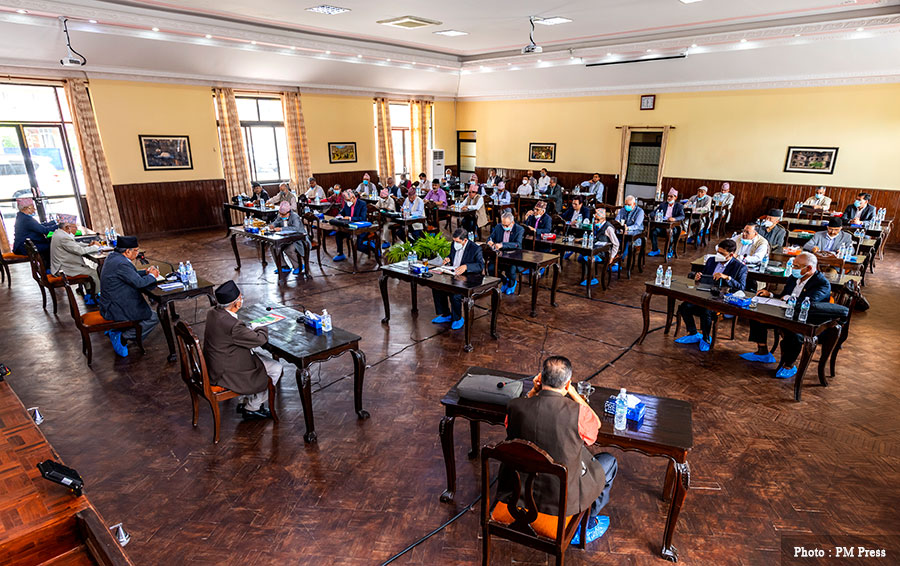
COVID-19: Nepal in Crisis The coronavirus crisis has brought to the fore — and exacerbated — a number of the Nepali state’s long-standing weaknesses. .......... The country went into relatively strict lockdown on March 24 and cases remained under 1,000 up until May 28. ......... The coronavirus crisis has brought to the fore — and exacerbated — a number of the Nepali state’s long-standing weaknesses like corruption, poor service delivery, and a failure to provide employment opportunities for millions of citizens who instead migrate to the Middle East, Malaysia, and elsewhere for labor jobs — and who now, unemployed, are beginning to return home in droves. ........ The health minister and several senior advisers in Prime Minister Khadga Prasad Sharma Oli’s coterie were accused of taking kickbacks while purchasing Chinese personal protective equipment (PPE) and other equipment, resulting in delays and the delivery of testing machines that did not even work. Two separate investigations are underway. ........ Even during normal times, the public healthcare system is understaffed and under-resourced. ....... Healthcare structural weaknesses have manifested in the government’s chaotic rollout of COVID quarantine centers and isolation centers throughout the country. Due to a lack of primary care facilities, thousands of infected migrant returnees were put in ad hoc isolation centers, often set up in schools that lacked cooking and bathing facilities and where detainees slept on the floor or on students’ benches. Many lack trained medical personnel or ambulances to take patients to a hospital if needed. Due to public outcry over the facilities, in which several people died, the government has recently begun allowing migrant returnees to undergo home-based quarantine and isolation. .............. Amid COVID, the federal government has designed most of the policies and guidelines but it has charged provincial and local governments with most of the implementation. Local officials have complained to the provinces and the federal government about a lack of material and financial support, and they have traded barbs over who is responsible for shortcomings. ........... The pandemic has also highlighted Nepal’s failure to provide opportunity and protection for migrant workers, up to a million of whom are now seeking to return to Nepal after losing jobs in foreign countries. Labor migration exploded during Nepal’s civil war from 1996-2006. ........... Nepal is the fifth-most remittance-dependent economy in the world, with millions of Nepalis working in India, the Middle East, Malaysia, and elsewhere. ........ As of June 25, less than 7,000 have returned from the Gulf and Malaysia, while the government estimates that between 400,000 and 1 million need to return. ......... The Supreme Court recently ordered the government to pay for tickets by mobilizing a special welfare fund into which all migrants deposit money before departing, but the government has been reluctant to spend this money. ......... chartered flights have prioritized passengers with political connections over those most in need, further fueling frustration with the government’s handling of the migrant crisis. ........ Meanwhile, the NCP government has shown a reluctance to bear criticism. During recent weeks the police have dispersed protests with tear gas and water cannons, and the government has sought to silence prominent critics within the bureaucracy. This comes along with an ongoing effort, which began before the pandemic, to pass new laws that could undermine freedom of expression and the free press. ............ Nepal’s coronavirus crisis is poised to worsen in the coming weeks. As the country reopens and allows in more migrant returnees, the infection rate is likely to skyrocket. The Health Ministry recently projected 40,000 cases by mid-July, with 2,000 patients requiring intensive care — numbers the current healthcare system is poorly equipped to handle. As of June 29, under 216,000 PCR tests have been performed, which experts say is far less than necessary as Nepal continues the reopening process. Meanwhile, Oli has begun downplaying the severity of the virus in public remarks. As the health crisis worsens, long-standing governance problems will continue to become more pronounced — and frustration will likely continue to grow.
E.U. May Bar American Travelers as It Reopens Borders, Citing Failures on Virus European Union officials are racing to agree on who can visit the bloc as of July 1 based on how countries of origin are faring with new coronavirus cases. Americans, so far, are excluded
A Multibillion-Dollar Opportunity: Virus-Proofing the New Office Tech, catering and design companies are rushing to sell employers on fever scanners, box lunches and office floor-planning apps for social distancing. But it’s too soon to tell if they will work.


Now I'm wondering if the above tweets amount to fueling anyone's hatred against any governments. Scared.
— Stuart Lau (@stuartlauscmp) June 30, 2020
